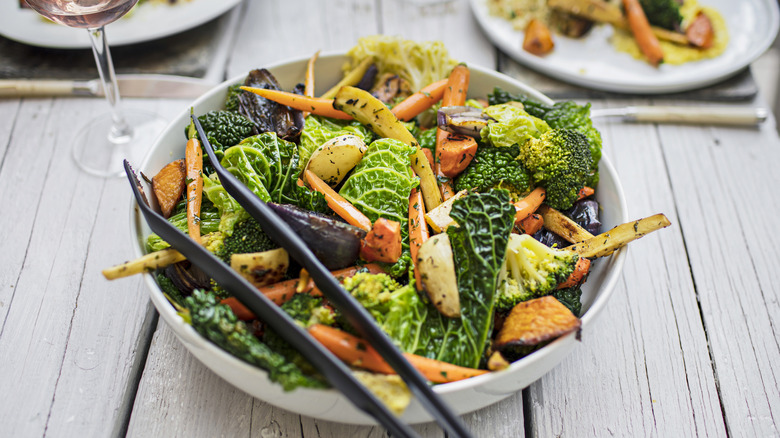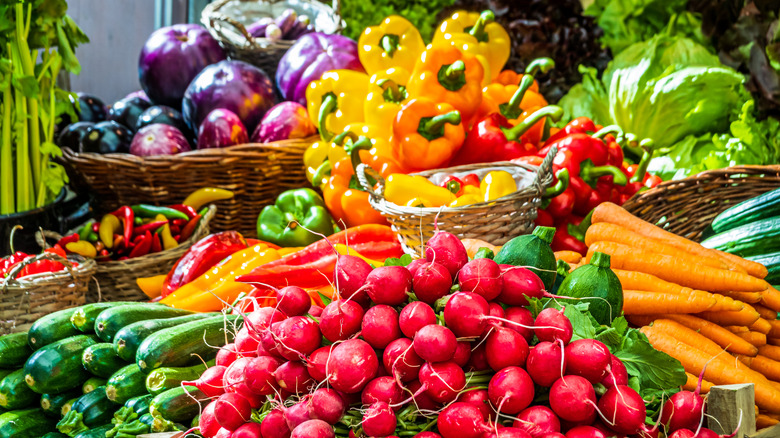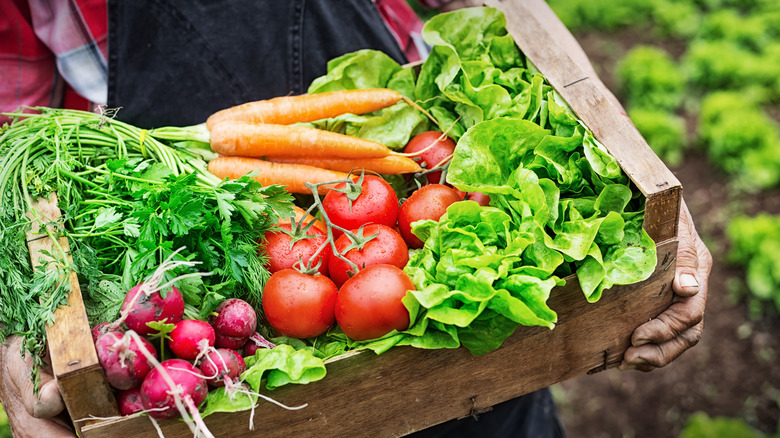For The Tastiest Salads, Make Sure You're Using In-Season Ingredients
Strawberries in winter, pumpkins in spring, and asparagus in fall are examples of out-of-season produce. While always having variety within reach can feel practical, using out-of-season ingredients can produce disappointing flavors. Where salad is concerned, while you can buy almost any ingredient year-round, it doesn't guarantee that it will deliver its optimal flavor. If you've never considered shopping seasonally, now is the time — do it for your salad.
When produce is grown with the seasons, it is usually harvested at the right time. Sensitive to climate and weather conditions, seasonal salad ingredients are a flavor enigma. It tends to indicate that they are sourced locally, which means less time from field to shelf. Consequently, your ingredients have also undergone less preservation to extend their shelf life. Preserving fresh produce through chilling can diminish those wonderful, delightful natural flavors. However, selecting in-season ingredients to build your salad will reward you with the biggest and most satisfying taste. Think artichokes in spring, corn in summer, kale in the fall, and broccoli in winter. Opt for these in-season ingredients to create the tastiest salad imaginable.
The four seasons
Developing seasonal salad recipes isn't complicated, making the finished dish much more satisfying. Usually, in spring, you'll have the chance to source fresh crispy cabbage, vibrant green spinach, or long and leafy Swiss chard. These in-season salad ingredients should be refreshing and uplifting, reflecting the departure from winter.
In summer, ingredients like green beans, tomatoes, zucchini, and bell peppers should all be in season. This bright and sweet produce matches those hot days. Summer also tends to be when juicy fruit like raspberries or blueberries are at their peak. Why not consider adding grilled peaches to your summer salad? The light, smoky, and floral notes are the perfect in-season salad combination.
In autumn, it's all about parsnips, sweet potatoes, yams, and the legendary Halloween icon, pumpkins. During fall, salads should echo the shift in temperature, where a more robust salad bowl satisfies your appetite on those colder, darker days. Winter is usually abundant with Brussels sprouts, beetroots, leeks, and winter squash. Winter seasonal ingredients are hearty and substantial, creating a comforting salad perfect for those chilly days.
There is also produce that is generally available year-round, such as carrots, cauliflower, and apples, which will present you with their delicious flavor no matter the season.
How to shop seasonally for salad
Creating salad with seasonal produce might appear a challenge, but it's much simpler than it seems. Shopping at a local greengrocer or farmers market can be the simplest way to find seasonal ingredients. Speak to your greengrocer and see what's available or likely to be in season soon; they will have the most recent information regarding fruitful harvests. You will also notice that produce will be abundant during certain times of the year, which usually indicates that it's been sourced locally and seasonally.
However, if you're choosing produce from a supermarket, you may need to dig to find the freshest produce, but you will also want to pay attention to the country of origin. In 2021, South Korea, Japan, and Taiwan were amongst the top exporters of fresh fruit and vegetables to the U.S., but their seasons vary compared to the West. When you purchase this produce, it's likely to have been preserved and lost its best, fresh flavor. Your salad will inevitably suffer.
Vegetable box subscriptions are also a fantastic way to access seasonal produce for your salad. Moreover, they can usually be delivered straight to your door, making them a seriously convenient option. Using seasonal ingredients for salads forces you to switch up your salad recipes and use vegetables you may not feel entirely comfortable with. Step outside of your comfort zone, and for the sake of your salad, use in-season ingredients that offer the finest flavors possible.


